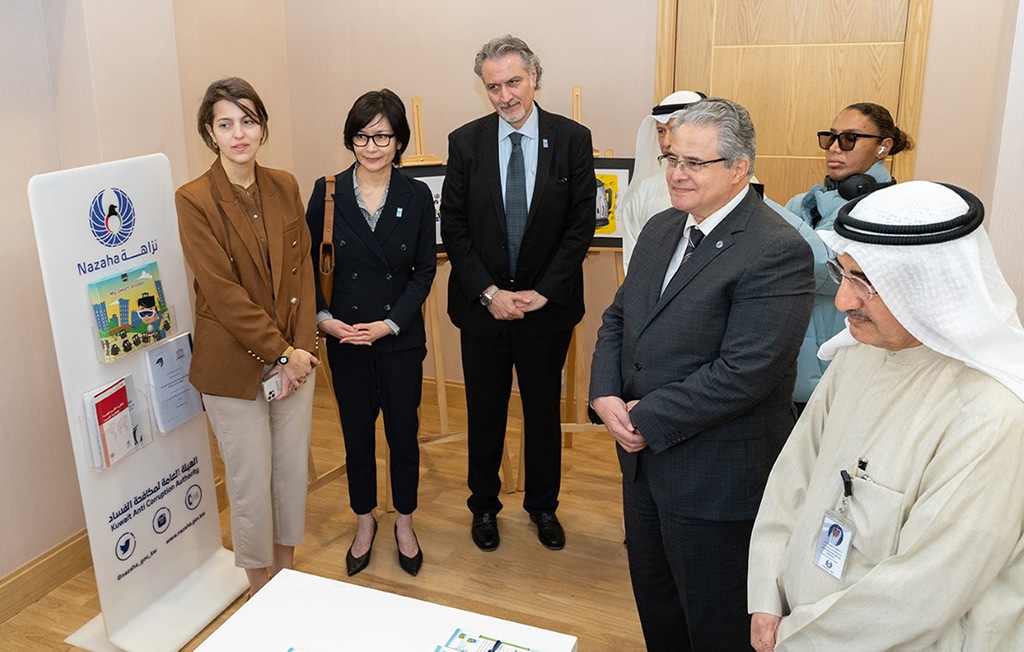By Majd Othman
KUWAIT: The Anti-Corruption Authority (Nazaha) organized on Thursday the second edition of its forum on the occasion of the International Anti-Corruption Day, titled "Digital Transformation and its Role in Promoting Integrity and Fighting Corruption" at the Authority's headquarters. The forum coincided with the 20th anniversary of the issuance of the United Nations Convention against Corruption in December 2003 when the UN launched a slogan entitled "Towards a United World Against Corruption" with the participation of the United Nations Office on Drugs and Crime (UNODC) and a number of government agencies, civil society experts, academics and specialists.
 KUWAIT: Nazaha Chairman Abdulaziz Al-Ibrahim delivers his opening speech. - KUNA
KUWAIT: Nazaha Chairman Abdulaziz Al-Ibrahim delivers his opening speech. - KUNA"Despite international and national efforts, the world still faces many challenges and great difficulties in extending its efforts to combat corruption and prevent its causes," said Chairman of the Authority Abdulaziz Al-Ibrahim in his opening speech. He said, "Perhaps the most prominent of them is the use of modern technology in corruption crimes. With the expansion and development of technology in the world, keeping pace with digital transformations, it has become one of the most important goals of countries to ensure growth in all fields while protecting them against corruption and enhancing the causes of their sustainability," he said.
"Nazaha was keen on highlighting this topic and the second integrity forum was chosen under the title "Digital Transformation and its Role in Promoting Integrity and Fighting Corruption". This comes in the context of Kuwait Vision 2035, the objectives of the government's action program, and Kuwait's strategy to promote integrity and combat corruption in order to create an environment for improving the efficiency and governance in public services and reforming the government's performance system. These efforts will also help the authorities in transforming government transactions into digital transactions and improving the Corruption Perceptions Index by 2026," he added.
Regional Director of the United Nations Office for Drugs and Crime (UNODC) in the GCC countries Hatem Ali participated in a recorded speech during which he praised the commission's efforts, the right choice of the topic of the forum and its impact on combating corruption and supporting the pillars of integrity, transparency and accountability. He appreciated such initiatives that seek to automate the general system for tenders, procurement and administrative and financial transactions in various sectors of the state.
"When there are strict standards and rules in place for digital transactions, it becomes difficult for the corrupt people and those who try to exploit the existing systems. Digital transformation provides the state with an opportunity to monitor its administrative and financial system," he pointed out.
Khaled Al-Muzaini, Director of the Planning and Follow-up Office at Nazaha underlined that digitization would reduce discretionary power, increase transparency and enable accountability, in addition to limiting human interactions leading to a disruption in corruption attempts. "The Council of Ministers confirmed, through a draft government action program 2022-2026, to work on digitizing government services," he said, adding that the Central Agency for Information Technology is entrusted with the task of implementing it under the axis of monitoring, evaluation and digitization.
 KUWAIT: The audience attending the forum.
KUWAIT: The audience attending the forum.Meanwhile, Al-Muzaini provided a number of recommendations in this regard, including the need for all agencies that provide public services to complete an inventory of the procedures of all services and prioritize the services that are prone to corruption risks in preparation for their digitization.
Bandar Al-Hazani, Director General of the General Department of Digital Analysis at the Control and Anti-Corruption Authority in Saudi Arabia, said that the kingdom attaches great importance to promoting the values of integrity, transparency, and combating corruption in all forms.
He added, "The kingdom is keen on participating with the international community in its efforts to fight corruption, given that its risks and ways of dealing with it are a shared responsibility. Therefore, the Kingdom has initiated several efforts, most notably the launch of the National Strategy for the Protection of Integrity, the establishment of the Oversight and Anti-Corruption Authority," he said. Pointing out that the kingdom harnesses all capabilities, ways and mechanisms in this field, in order to achieve the Kingdom's Vision 2030, he said, digital transformation is an important goal to achieve in order to enhance the level of performance, develop government services and boost spending efficiency, transparency and accountability. This will reflect positively on enhancing integrity and fighting corruption," he added.
Dhari Al-Huwail, associate professor at the College of Life Sciences at Kuwait University, spoke about data governance and information transparency, its importance and the need for it, in order to adopt policies that enhance information transparency in state institutions and their dealings. This will help in building systems, mechanisms and frameworks for information governance, data and digital operations in institutions and companies and provide accurate and updated data in an open source format in an easy way, in addition to establishing a central national data bank.
Shorouq Al-Sayegh, a member of the Kuwait Information Technology Society, spoke about the most important challenges in implementing digital transformation. The most important element in society's acceptance of digital transformation is awareness of the importance of this step towards achieving economic, educational and health development, as awareness begins with the citizen, teacher and employee," he pointed out.











